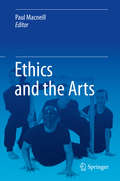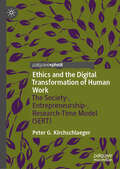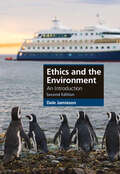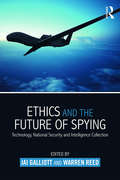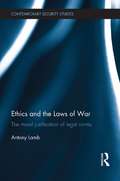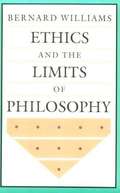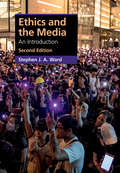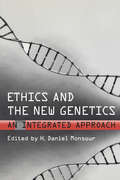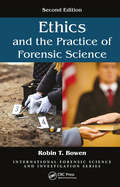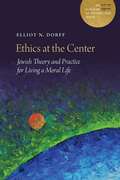- Table View
- List View
Ethics and the Arts
by Paul MacneillThis book proposes that the highest expression of ethics is an aesthetic. It suggests that the quintessential performance of any field of practice is an art that captures an ethic beyond any literal statement of values. This is to advocate for a shift in emphasis, away from current juridical approaches to ethics (ethical codes or regulation), toward ethics as an aesthetic practice--away from ethics as a minimal requirement, toward ethics as an aspiration. The book explores the relationship between art and ethics: a subject that has fascinated philosophers from ancient Greece to the present. It explores this relationship in all the arts: literature, the visual arts, film, the performing arts, and music. It also examines current issues raised by 'hybrid' artists who are working at the ambiguous intersections between art, bio art and bioethics and challenging ethical limits in working with living materials. In considering these issues the book investigates the potential for art and ethics to be mutually challenged and changed in this meeting. The book is aimed at artists and students of the arts, who may be interested in approaching ethics and the arts in a new way. It is also aimed at students and teachers of ethics and philosophy, as well as those working in bioethics and the health professions. It will have appeal to the 'general educated reader' as being current, of considerable interest, and offering a perspective on ethics that goes beyond a professional context to include questions about how one approaches ethics in one's own life and practices.
Ethics and the Beast: A Speciesist Argument for Animal Liberation
by Tzachi ZamirMany people think that animal liberation would require a fundamental transformation of basic beliefs. We would have to give up "speciesism" and start viewing animals as our equals, with rights and moral status. And we would have to apply these beliefs in an all-or-nothing way. But in Ethics and the Beast, Tzachi Zamir makes the radical argument that animal liberation doesn't require such radical arguments--and that liberation could be accomplished in a flexible and pragmatic way. By making a case for liberation that is based primarily on common moral intuitions and beliefs, and that therefore could attract wide understanding and support, Zamir attempts to change the terms of the liberation debate. Without defending it, Ethics and the Beast claims that speciesism is fully compatible with liberation. Even if we believe that we should favor humans when there is a pressing human need at stake, Zamir argues, that does not mean that we should allow marginal human interests to trump the life-or-death interests of animals. As minimalist as it sounds, this position generates a robust liberation program, including commitments not to eat animals, subject them to factory farming, or use them in medical research. Zamir also applies his arguments to some questions that tend to be overlooked in the liberation debate, such as whether using animals can be distinguished from exploiting them, whether liberationists should be moral vegetarians or vegans, and whether using animals for therapeutic purposes is morally blameless.
Ethics and the Built Environment: Human Relationships, Nature, And The Built Environment (Professional Ethics)
by Warwick FoxMuch has been written in recent years on environmental ethics relating to the more general 'natural' environment but little specifically written about ethics of the built environment. Ethics and the Built Environment responds to this need and offers a debate on the ethical dimension of building in all its forms from a variety of disciplinary perspectives and approaches.This book should be of interest to architects, students of building and building design, environmentalists, politicians and general readers with an interest in ethics.
Ethics and the Contemporary World
by David EdmondsArguments about ethics often centre on traditional questions of, for instance, euthanasia and abortion. Whilst these questions are still in the foreground, recent years have seen an explosion of new moral problems. Moral and political clashes are now as likely to be about sexuality and gender and the status of refugees, immigrants and borders, or the ethics of social media, safe spaces, disability and robo-ethics. How should we approach these debates? What are the issues at stake? What are the most persuasive arguments? Edited by best-selling philosophy author David Edmonds, Ethics and the Contemporary World assembles a star-studded line-up of philosophers to explore twenty-five of the most important ethical problems confronting us today. They engage with moral problems in race and gender, the environment, war and international relations, global poverty, ethics and social media, democracy, rights and moral status, and science and technology. Whether you want to learn more about the ethics of poverty, food, extremism, or artificial intelligence and enhancement, this book will help you understand the issues, sharpen your perspective and, hopefully, make up your own mind.
Ethics and the Digital Transformation of Human Work: The Society-, Entrepreneurship-, Research-Time Model (SERT)
by Peter G. KirchschlaegerDigital transformation and &“AI&”— more adequately defined as &“Data-Based Systems DS&”— will create new jobs and lead to disruptions. Will digital transformation and Data-Based Systems DS lead to a massive reduction of paid professional tasks for humans? This book offers a critical and comprehensive discussion of the impact of digital transformation on human jobs from an ethical perspective. It presents an ethically sound and concrete model to address this pressing issue for societies worldwide: the Society-, Entrepreneurship-, Research-Time-Model (SERT).
Ethics and the Early Childhood Educator: Using the NAEYC Code (2nd Edition)
by Peter J. Pizzolongo Stephanie Feeney Nancy K. FreemanThe second edition of Ethics and the Early Childhood Educator: Using the NAEYC Code is an NAEYC resource that we are pleased to publish and that follows a history of two minor revisions to the first edition. This edition includes situations that involve ethical dimensions--responsibilities and dilemmas-- based on the 2005 revision and the 2011 reaffirmation and updating of the Code.
Ethics and the Endangerment of Children's Bodies
by Gunter Graf Gottfried SchweigerThis book addresses the endangerment of children's bodies in affluent societies. Bodily integrity is an important part of a child's physical and mental well-being, but it can also be violated through various threats during childhood; not only affecting physical health but also causing mental damage and leading to distortions in the development of the self. The authors give an account of three areas, which present different serious dangers: (1) body and eating, (2) body and sexuality, and (3) body and violence. Through an in-depth examination of the available theoretical and empirical knowledge, as well as a thorough ethical analysis, the central injustices in the mentioned areas are identified and the agents with responsibilities towards children displayed. The authors conclude by providing invaluable insight into the necessity of an ethical basis for policies to safeguard children and their bodies.
Ethics and the Environment: An Introduction (Cambridge Applied Ethics)
by Dale JamiesonThis new edition of a widely used and cited introduction to ethics and the environment offers a broad and lively discussion of nature's future, focusing on climate change, conservation, and justice for both our contemporaries and future generations. It discusses the nature of environmental problems and their relationship to economics, religion, technology, and aesthetics. It includes incisive discussions of our moral relations with other animals, and of how animals are used in our food systems. It also provides a deep discussion of the value of nature, which takes up ecofeminist and deep ecology views as well as sentientism and biocentrism. It discusses the plurality of values, and applies this analysis to some conflicts from the author's home state of California. The volume is comprehensively revised and updated, with several new chapters, and concludes with a compelling discussion of the question “How should I live?” in this new epoch of the Anthropocene.
Ethics and the Environmental Health Profession: The Importance of Being Ethical (Routledge Focus on Environmental Health)
by Stephen Battersby David MilesProviding an exploration of the discussion on how a stronger ethical basis for the work of environmental health practitioners (EHPs) can contribute to improved public health, because EHPs/environmental health officers (EHOs) come into daily contact with members of the public to address threats to their health and wellbeing. This book examines what is meant by professional ethics and the role of professional bodies in ensuring members of the profession act ethically. They should be expected to act as guardians of the public interest, without fear or favour. Ethics is an integral part of public health decision-making and needs to be incorporated into public and environmental health policy development and decision-making. This work, while seeking to stimulate debate within the environmental health profession, will examine what this means for EHPs.Ethics and the Environmental Health Profession: The Importance of Being Ethical explores the process of ethical decision-making in the environmental health profession and asks the question of whom EHPs have an ethical duty towards in their work. It looks at a variety of ethical issues which arise for EHPs working in local government, as consultants or for commercial companies.This book is useful for EHPs globally, other local government officers, educational establishments where environmental and public health courses are run globally, elected members of local authorities, and policymakers at national and local government levels.
Ethics and the Future of Spying: Technology, National Security and Intelligence Collection (Studies in Intelligence)
by Jai Galliott Warren ReedThis volume examines the ethical issues generated by recent developments in intelligence collection and offers a comprehensive analysis of the key legal, moral and social questions thereby raised. Intelligence officers, whether gatherers, analysts or some combination thereof, are operating in a sea of social, political, scientific and technological change. This book examines the new challenges faced by the intelligence community as a result of these changes. It looks not only at how governments employ spies as a tool of state and how the ultimate outcomes are judged by their societies, but also at the mind-set of the spy. In so doing, this volume casts a rare light on an often ignored dimension of spying: the essential role of truth and how it is defined in an intelligence context. This book offers some insights into the workings of the intelligence community and aims to provide the first comprehensive and unifying analysis of the relevant moral, legal and social questions, with a view toward developing policy that may influence real-world decision making. The contributors analyse the ethics of spying across a broad canvas – historical, philosophical, moral and cultural – with chapters covering interrogation and torture, intelligence’s relation to war, remote killing, cyber surveillance, responsibility and governance. In the wake of the phenomena of WikiLeaks and the Edward Snowden revelations, the intelligence community has entered an unprecedented period of broad public scrutiny and scepticism, making this volume a timely contribution. This book will be of much interest to students of ethics, intelligence studies, security studies, foreign policy and IR in general.
Ethics and the Global Financial Crisis
by Boudewijn De BruinIn this topical book, Boudewijn de Bruin examines the ethical 'blind spots' that lay at the heart of the global financial crisis. He argues that the most important moral problem in finance is not the 'greed is good' culture, but rather the epistemic shortcomings of bankers, clients, rating agencies and regulators. Drawing on insights from economics, psychology and philosophy, de Bruin develops a novel theory of epistemic virtue and applies it to racist and sexist lending practices, subprime mortgages, CEO hubris, the Madoff scandal, professionalism in accountancy and regulatory outsourcing of epistemic responsibility. With its multidisciplinary reach, Ethics and the Global Financial Crisis will appeal to scholars working in philosophy, business ethics, economics, psychology and the sociology of finance. The many concrete examples and case studies mean that this book will also prove useful to policy-makers and regulators.
Ethics and the Golden Rule
by Harry J GenslerIt is commonly accepted that the golden rule—most often formulated as "do unto others as you would have them do unto you"—is a unifying element between many diverse religious traditions, both Eastern and Western. Its influence also extends beyond such traditions, since many non-religious individuals hold up the golden rule as central to their lives. Yet, while it is extraordinarily important and widespread, the golden rule is often dismissed by scholars as a vague proverb that quickly leads to absurdities when one attempts to formulate it in clear terms. In this book, Harry J. Gensler defends the golden rule and addresses all of the major philosophic objections, pointing out several common misunderstanding and misapplications. Gensler first discusses golden-rule reasoning and how to avoid the main pitfalls. He then relates the golden rule to world religions and history, and to areas like moral education, egoism, evolution, society, racism, business, and medicine. The book ends with a discussion of theoretical issues (like whether all morality reduces to the golden rule, which the author argues against). Ethics and the Golden Rule offers two introductory chapters, the first is simpler and the second more technical; a reader may start with either or both. One can then read any combination of further chapters, in any order, depending on one’s interests; but Chapters 13 and 14 are technical and assume one has read Chapter 2. This is "a golden-rule book for everyone," accessible to a wide readership.
Ethics and the Laws of War: The Moral Justification of Legal Norms (Contemporary Security Studies)
by Antony LambThis book is an examination of the permissions, prohibitions and obligations found in just war theory, and the moral grounds for laws concerning war. Pronouncing an action or course of actions to be prohibited, permitted or obligatory by just war theory does not thereby establish the moral grounds of that prohibition, permission or obligation; nor does such a pronouncement have sufficient persuasive force to govern actions in the public arena. So what are the moral grounds of laws concerning war, and what ought these laws to be? Adopting the distinction between jus ad bellum and jus in bello, the author argues that rules governing conduct in war can be morally grounded in a form of rule-consequentialism of negative duties. Looking towards the public rules, the book argues for a new interpretation of existing laws, and in some cases the implementation of completely new laws. These include recognising rights of encompassing groups to necessary self-defence; recognising a duty to rescue; and considering all persons neither in uniform nor bearing arms as civilians and therefore fully immune from attack, thus ruling out ‘targeted’ or ‘named’ killings. This book will be of much interest to students of just war theory, ethics of war, international law, peace and conflict studies, and Security Studies/IR in general.
Ethics and the Limits of Philosophy
by Bernard WilliamsIn this book Bernard Williams delivers a sustained indictment of moral theory from Kant onward. His goal is nothing less than to reorient ethics toward the individual. He deals with the most thorny questions in contemporary philosophy and offers new ideas about issues such as relativism, objectivity, and the possibility of ethical knowledge.
Ethics and the Limits of Philosophy (Routledge Classics Ser.)
by Bernard WilliamsBy the time of his death in 2003, Bernard Williams was one of the greatest philosophers of his generation. Ethics and the Limits of Philosophy is not only widely acknowledged to be his most important book, but also hailed a contemporary classic of moral philosophy. Presenting a sustained critique of moral theory from Kant onwards, Williams reorients ethical theory towards ‘truth, truthfulness and the meaning of an individual life’. He explores and reflects upon the most difficult problems in contemporary philosophy and identifies new ideas about central issues such as relativism, objectivity and the possibility of ethical knowledge. This edition also includes a new commentary on the text by A.W.Moore and a foreword by Jonathan Lear.
Ethics and the Media: An Introduction (Cambridge Applied Ethics)
by Stephen J. WardNow revised and containing several new chapters, this book provides a comprehensive set of ethical principles and methods of reasoning for a new era of digital, global media. It describes the turbulent state of media ethics in ordinary language and through clear examples, and provides a pragmatic theory of truth and objectivity for engaged media. Concrete guidelines are articulated for identifying fake news and for reporting responsibly on social media racism, extreme groups, and anti-democratic demagogues, showing how citizens and journalists can work together to detox a polluted public sphere. The book examines global media ethics, where norms guide the reporting of global issues such as climate change and immigration, and considers what constitutes responsible journalism. It will be valuable for both students and practitioners of journalism and media ethics, and can also be used as a citizen's guide for evaluating media reports.
Ethics and the New Genetics: An Integrated Approach (Lonergan Studies)
by H. Daniel MonsourEveryday, new advances are being made in the science of human genetics. Accompanying progress in this area, however, are new ethical dilemmas. At a think tank sponsored by the Canadian Catholic Bioethics Institute, an interdisciplinary group of ethicists, geneticists, physicians, lawyers, and theologians gathered in an attempt to apply some features of Bernard Lonergan's notion of functional specialization to ethical debates surrounding genetics. Editor H. Daniel Monsour has brought together a series of articles presented at this think tank. The articles accomplish two tasks: first, they explore some of the advances in human genetic that continue to prompt ethical debate and outline the different stances on those issues; second, they examine those stances in the context of Roman Catholic moral and religious thought. Timely, innovative, and wide-ranging, this collection will be of interest to bioethicists and philosophers, as well as religious and Lonerganian scholars.
Ethics and the Practice of Forensic Science (International Forensic Science and Investigation)
by Robin T. BowenWhile one would hope that forensic scientists, investigators, and experts are intrinsically ethical by nature, the reality is that these individuals have morality as varied as the general population. These professionals confront ethical dilemmas every day, some with clear-cut protocols and others that frequently have no definitive answers. Since the publication of the first edition of Ethics and the Practice of Forensic Science, the field of forensic science has continued to see its share of controversy. This runs the gamut of news stories from investigators, lab personnel, or even lab directors falsifying results, committing perjury, admitting to fraud, to overturned convictions, questions about bias, ethics, and what constitutes an "expert" on the witness stand. This fully updated edition tackles all these issues—including some specific instances and cases of unethical behavior—and addresses such salient issues as accreditation requirements, standardization of ethical codes, examiner certification, and standards for education and training. The new edition provides: A new chapter on the "Ferguson Effect" faced by the criminal justice system The context of forensic science ethics in relation to general scientific ethics, measurement uncertainty, and ethics in criminal justice Ethical conundrums and real-world examples that forensic scientists confront every day The ethics and conduct codes of 20 different forensic and scientific professional organizations An outline of the National Academies of Science (NAS) recommendations and progress made on ethics in forensic science since the release of the NAS report Ethics and the Practice of Forensic Science, Second Edition explores the range of ethical issues facing those who work in the forensic sciences—highlights the complicated nature of ethics and decision-making at the crime scene, in the lab, and in the courts. The book serves both as an essential resource for laboratories to train their employees and as an invaluable textbook for the growing number of courses on ethics in criminal justice and forensic science curricula. Accompanying PowerPoint® slides and an Instructor’s Manual with Test Bank are available to professors upon qualifying course adoption.
Ethics and the Practice of Forensic Science (International Forensic Science and Investigation)
by Robin T. BowenIntegrity and honesty are the hallmarks of science - and especially so in the case of forensic science - making the study and practice of ethics essential to the field. Ethics and the Practice of Forensic Science, Third Edition directly addresses common stressors that can induce, or lead professionals - working in forensic laboratories, law enforcement, the judicial system, and at crime scenes - to commit misconduct.While forensic scientists, investigators, and experts are intrinsically ethical by nature, the reality is that these individuals face challenges including departmental or political pressures, lack of training, and conflicting standards. The difference, however, is that the work done by forensic professionals has the ability to compromise another person’s freedom, potentially leading to arrest, incarceration, and miscarriages of justice. Police and forensic professionals confront ethical dilemmas every day, some situations that fall within clear protocols or standards and others that frequently have no definitive answers.Ethics and the Practice of Forensic Science, Third Edition includes updated information and case studies, as well as recent research findings focused on ethics in forensic science. Chapters examine investigation and police culture through the lens of professional challenges, incorporating important information about the history of wrongful convictions, and including recent developments in overturned wrongful convictions, and the work of various innocence projects. Throughout the book, case examples of bias, ethical violations, and instances of tampering with evidence present the dangers of compromising one’s ethical standards. Through such cases, the book sheds light on the problem and offers alternative courses of action - presenting examples of what to do, and what not to do, when faced with ethical decisions in gathering, handling, analyzing, and presenting evidence.
Ethics and the Problem of Evil (Indiana Series in the Philosophy of Religion)
by John Hare Laura Garcia Stephen Maitzen Bruce Russell Marilyn McCord Adams Linda Zagzebski Stephen J. WykstraProvocative essays that seek &“to turn the attention of analytic philosophy of religion on the problem of evil . . . towards advances in ethical theory&” (Reading Religion). The contributors to this book—Marilyn McCord Adams, John Hare, Linda Zagzebski, Laura Garcia, Bruce Russell, Stephen Wykstra, and Stephen Maitzen—attended two University of Notre Dame conferences in which they addressed the thesis that there are yet untapped resources in ethical theory for affecting a more adequate solution to the problem of evil. The problem of evil has been an extremely active area of study in the philosophy of religion for many years. Until now, most sources have focused on logical, metaphysical, and epistemological issues, leaving moral questions as open territory. With the resources of ethical theory firmly in hand, this volume provides lively insight into this ageless philosophical issue. &“These essays—and others—will be of primary interest to scholars working in analytic philosophy of religion from a self-consciously Christian standpoint, but its audience is not limited to such persons. The book offers illustrative examples of how scholars in philosophy of religion understand their aims and how they go about making their arguments . . . hopefully more work will follow this volume&’s lead.&”—Reading Religion &“Recommended.&”—Choice
Ethics and the Quest for Wisdom
by Robert KaneModernity has challenged the ancient ideal of a universal quest for wisdom, and today's world of conflicting cultures and values has raised further doubts regarding the possibility of objective ethical standards. Robert Kane refocuses the debate on the philosophical quest for wisdom, and argues that ethical principles about right action and the good life can be seen to emerge from that very quest itself. His book contends that the search for wisdom involves a persistent striving to overcome narrowness of vision that comes from the inevitable limitations of finite points of view. When applied to questions of value and the good life, this striving has ethical implications about the way we should treat ourselves and others. This study argues for the merits of this central thesis against alternative theories in contemporary normative ethics, and discusses its practical applications for social ethics, political philosophy, law and moral education.
Ethics as a Work of Charity: Thomas Aquinas and Pagan Virtue
by David DecosimoMost of us wonder how to make sense of the apparent moral excellences or virtues of those who have different visions of the good life or different religious commitments than our own. Rather than flattening or ignoring the deep difference between various visions of the good life, as is so often done, this book turns to the medieval Christian theologian Thomas Aquinas to find a better way. Thomas, it argues, shows us how to welcome the outsider and her virtue as an expression rather than a betrayal of one's own distinctive vision. It shows how Thomas, driven by a Christian commitment to charity and especially informed by Augustine, synthesized Augustinian and Aristotelian elements to construct an ethics that does justice#151;in love#151;to insiders and outsiders alike. Decosimo offers the first analysis of Thomas on pagan virtue and a reinterpretation of Thomas's ethics while providing a model for our own efforts to articulate a truthful hospitality and do ethics in our pluralist, globalized world.
Ethics at War: How Should Military Personnel Make Ethical Decisions? (War, Conflict and Ethics)
by Deane-Peter Baker Rufus Edward Black Roger Gordon Herbert Iain Benjamin KingThis book debates competing approaches to ethical decision-making for members of the armed forces of liberal democratic states. In this volume, four prominent thinkers propose and debate competing approaches to ethical decision-making for military personnel. Deane-Peter Baker presents and expounds the ‘Ethical Triangulation’ model, an ethical decision-making method he has employed through much of his career as an applied military ethicist. Rufus Black advocates for a natural law-based approach, one which has heavily influenced the framework formally adopted by the Australian Defence Force. Roger Herbert outlines the ‘Moral Deliberation Roadmap’, the moral reasoning framework recently adopted by the US Naval Academy. Iain King then sets out a model of quasi-utilitarian decision-making developed in several post-conflict settings and refined at the UK’s Royal College of Defence Studies. After the opening chapters in which each author outlines their favoured decision-making approach, the four contributors then evaluate each other’s proposals, often critically. Philosopher David Whetham offers some concluding thoughts in which he summarizes areas of agreement between the authors, identifies key areas of difference, and suggests directions for future research. This book will be of great interest to students of military ethics, the ethics of war, moral philosophy, and International Relations, as well as military professionals.
Ethics at the Center: Jewish Theory and Practice for Living a Moral Life (A JPS Scholar of Distinction Book)
by Rabbi Elliot N. DorffEthics at the Center culls the best of Rabbi Elliot N. Dorff&’s pioneering thinking in Jewish ethics over nearly five decades. Dorff shows that our response to moral issues depends ultimately on our conceptions of the nature of human beings and God; how Jewish law, theology, prayer, history, and community should also define and motivate Jewish responses to moral issues; and how the honorable and divergent stances of Western philosophy and other religions about moral living shed light on Judaism&’s distinctive standpoints. From there Dorff applies Judaism&’s ethics to real life: abortion post–Roe v. Wade, sexual orientation and human dignity, avoiding harm in communication, playing violent or defamatory video games, modern war ethics, handling donations of ill-gotten gain after the fact. In conclusion he explores how Jewish family and community, holidays and rituals, theology, study, and law have moral import as well. Dorff&’s personal introduction to each chapter reflects on why and when he wrote its contents, its continuing relevance, and if—and if so, how—he would now change what he wrote earlier. Readers will experience not only his evolving ethical thought but many facets of the person and the Jew that Dorff is today.
Ethics at the End of Life: New Issues and Arguments
by John DavisThe 14 chapters in Ethics at the End of Life: New Issues and Arguments, all published here for the first time, focus on recent thinking in this important area, helping initiate issues and lines of argument that have not been explored previously. At the same time, a reader can use this volume to become oriented to the established questions and positions in end of life ethics, both because new questions are set in their context, and because most of the chapters—written by a team of experts—survey the field as well as add to it. Each chapter includes initial summaries, final conclusions, and a Related Topics section.
